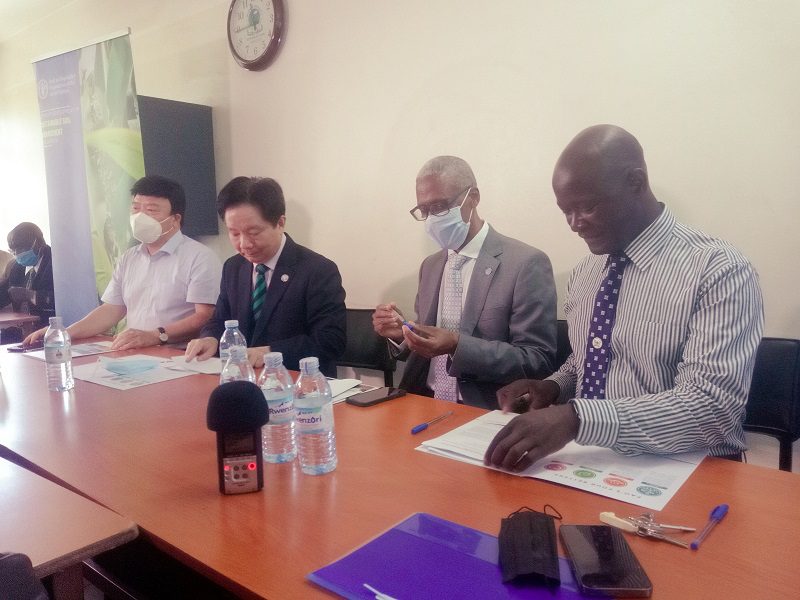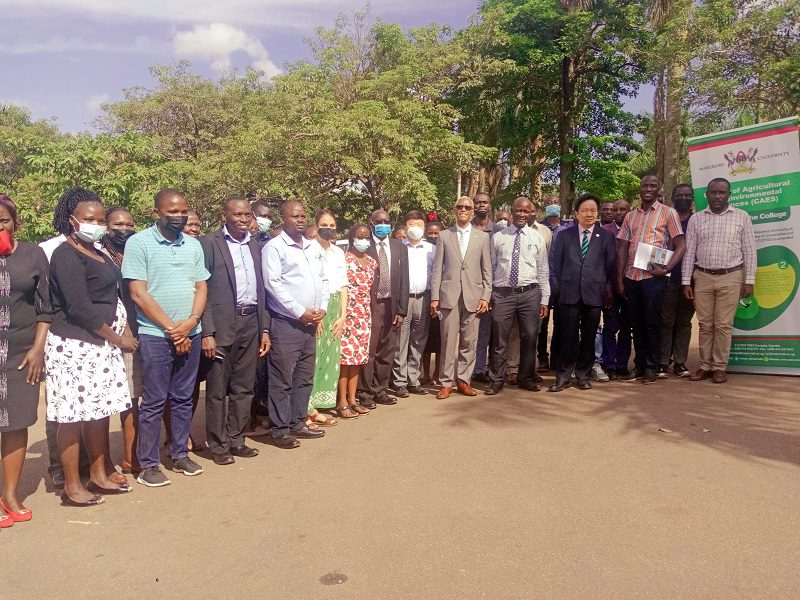
KAMPALA – Food and Agriculture Organisation of the United Nations – FAO in partnership with Makerere University have on Monday began a five-day digital soil-mapping training course to selected scientists to enhance the use of fertilizers to scale up the sustainable management of soils in Uganda.
Titled: “Capacity Development on Sustainable Soil Management for Uganda”, the workshop is aimed at contributing to building capacity for national soil database and soil monitoring for the key stakeholders in Uganda.
The training is part of FAO’s ongoing intervention to strengthen capacity of public and private institutions and communities to sustainably manage natural resources, restore degraded lands and protect vital ecosystems.
Organized through FAO’s project on “Capacity development on sustainable soil management – Africa”, the soil-mapping course is financed by the China International Center for Economic and Technical Exchange and the Ministry of Commerce of the People’s Republic of China.
Opening the training at the College of Computing and Information Sciences, Makerere University on Monday afternoon, Mr Anping Ye, Director, Office of South-South and Triangular Cooperation Division, FAO said that the activity is within the context of the South-South cooperation arrangements.
“Under the South to South Cooperation, FAO plays an active role in facilitating cooperation between countries to exchange information, knowledge and technologies to promote agriculture, reduce food insecurity and malnutrition.”
“In the context of Uganda, in Agriculture sector, FAO has facilitated cooperation arrangements between Uganda and Peoples Republic of China. One of the ongoing cooperation arrangements with Uganda, in particular through Ministry of Agriculture, Animal Industry and Fisheries, is sharing of knowledge and experiences on sustainable soil management,” he added.
Mr. Ye said that sustainable soil management contributes directly and indirectly to the achievement of at least ten Sustainable Development Goals (SDGs), arguing that however, the achievements of SDGs can be constrained if soil productivity decline is not managed.
“Unsustainable practices lead to the degradation of soil properties and decline in soil productivity. In most developing countries including some in Africa, the decline in productivity is happening at an alarming rate. This should be of concern to all of us.”
According to him, due to inappropriate soil management recommendations and low adoption of good practices, good soil monitoring system is urgently needed.
He noted that caring for the soils and preserving soils globally and in Uganda is very important for human wellbeing.
“This can be achieved through your efforts in your respective organization to exploit the knowledge on soil monitoring system and soil database among other areas that need to be addressed to ensure soils are sustainably managed.”

Prof. Gorettie Nabanoga, said that in Uganda, proper fertilizer use remains, something she says is a major challenge especially when farmers are expected to use the right amount, right type, with right placement and right timing.
Represented by her deputy, Prof. Yazidhi Bamutaze, she revealed that farmers often get challenged in the field while using fertilizers especially if the fields are highly variable in soil fertility.
“This field variability requires soil testing to ensure that the right amount of fertilizer is applied. With the advancement in digital technologies, farmers can now be helped to know the state of soil fertility variability using simple maps developed using digital tools. These tools can show how soil fertility varies on their field and how farmers can apply the fertilizers. It is from this background that I find this training in digital soil mapping very crucial for academia and extension experts in agriculture so that they could assist farmers apply fertilizers with improved precision.”
She commended FAO for always partnering with Makerere University in the areas of research, training and outreach.
She also urged take the partners to continue collaborating with Makerere University.
In his part, Dr. Antonio Querido, the FAO Uganda representative said that too often, soils are taken for granted, and used as a cliché.
“…soil is fertile, anything you throw in the soil in Uganda will grow but we do not know what is in our soil.”
He said that the results from the research centers and what farmers are getting, there’s a discrepancy.
“Farmers will yield about 2.5 tonnes in a season and research trials from NARO or Makerere will yield 10times. We want farmers to be able to use the same parameters to get such yields and the quality of our soil and how we manage it is critical,” he urged.
Dr. Antonio said the training and project will create knowledge and explore opportunities to boost more training.
“We need to recognize soil as part of the global fight on climate change, we will not achieve our goals if we do not improve the quality of soil. Not only for fertility but for the climate change fight.”






